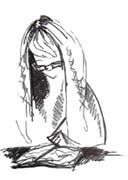 Although I'm not terribly fond of the word "potential," I think it must be used here. As in, "Wow, this book had such potential." See, it's subtitled An Accidental Soldier's Account of the War in Iraq, which pretty much sums up the intense and difficult material that Mr. Crawford is dealing with, and ordinarily I would be impressed that he confronted it so boldly and wrote about the things he saw and did and suffered in Iraq, accepting the possibility that plenty of people just won't understand.
Although I'm not terribly fond of the word "potential," I think it must be used here. As in, "Wow, this book had such potential." See, it's subtitled An Accidental Soldier's Account of the War in Iraq, which pretty much sums up the intense and difficult material that Mr. Crawford is dealing with, and ordinarily I would be impressed that he confronted it so boldly and wrote about the things he saw and did and suffered in Iraq, accepting the possibility that plenty of people just won't understand.How can you understand if you haven't been there,?
So, cool. He wrote the book. What gets me all fussy is the reviews, the glowing, raving reviews (on the back of the book, and in People magazine--obviously this isn't a fair sampling, but it was enough to get my hopes up) that placed Crawford up in the war-story realm of Trumbo and Heller, and proclaimed his book "a heartbreaking and perversely beautiful book that should join Catch-22 and The Things They Carried as this generation's defining literary expression of men at war" (James Frey).
The hopes were sky high, I was rubbing my hands together gleefully, ready to be sad and sick and sticky with desert sand, when I encountered, on page 8, the sentence "Ringlets of her hair cascaded off her pillow in a bright crimson waterfall."
I make no bones about being a total snob. I know I am. And this was where the English degree kicked in, and I cringed, my right eye twitched a bit, as it always does when in the presence of a bad cliche. But I stuck it out, reading the book in pieces over the course of a few months, because too much at once made me despair--the stories he had to tell were horrible and chilling and so very relevant, but so weighted down by cliche and stock description that most of the punch, to me, was lost. Once or twice, I raised my eyebrows or flinched, but mostly I shook my fist at the open book and protested, "That could have been so good! I might have cried, I might have gone all cold and sweaty if you'd drawn it out a bit, made me feel it!"
Not until the very last chapter does Crawford begin to toy with structure and timing, and it works pretty well--probably in that last story he makes more of a coherent point than he does in the whole rest of the book, but I suspect that someone will object, "War doesn't have a point, so why should a book about war have a point?" To which I will shrug, and say, "I like points. They make me feel less like I'm wasting my time."
Perhaps this true story would have done better as a novel. Fiction provides a bit of distance, allows the truth a little more room to maneuver--notice that Catch-22, Johnny Got His Gun and Slaughterhouse-5 are all novels, if rather autobiographical ones (well, okay, not Johnny, but still), and that the distance between reader and character is almost merciful. When a fictional character does something in the bounds of war that makes us squeamish, we're not tempted to flip to the back of the dustjacket and study their photo and squint and wonder, How...?
It's not that we're desensitized to the characters, but that they are not telling the story--the author is--and so we are not left with the uneasy sense that we, the readers, cannot trust them to tell the story. Crawford made me uneasy, because he was too involved. Of course he was too involved, it is his story, but I somehow couldn't trust him, as a narrator, to tell it right.
RATING: 1

No comments:
Post a Comment